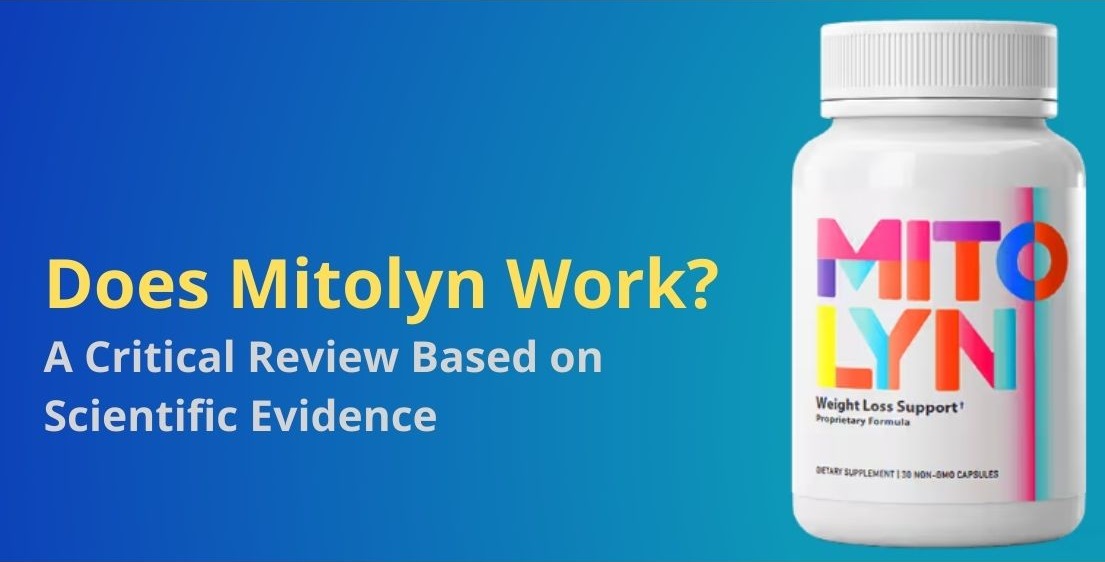Does Mitolyn Work? A Critical Review Based on Scientific Evidence
In recent years, mitochondrial health has garnered significant attention in the wellness industry, with numerous supplements claiming to enhance cellular energy and metabolism. One such product is Mitolyn, marketed as a mitochondrial health booster aimed at improving energy levels and supporting metabolism. However, the question remains: does Mitolyn truly deliver on its promises?
This article critically examines the scientific evidence behind Mitolyn’s ingredients and evaluates whether the supplement lives up to its claims.
What Is Mitolyn?
Mitolyn is a dietary supplement that combines six plant-based ingredients: Maqui Berry, Rhodiola Rosea, Haematococcus Pluvialis (astaxanthin), Amla, Theobroma Cacao, and Schisandra. These components are promoted for their antioxidant, adaptogenic, and anti-inflammatory properties, which are believed to support mitochondrial function and overall metabolic health.
Manufactured in the United States at facilities that claim FDA registration and GMP certification standards, Mitolyn positions itself as a non-stimulant, non-habit forming solution that works by addressing what the creators claim is the root cause of metabolic dysfunction.
The Science Behind the Ingredients
1. Maqui Berry
Maqui Berry is rich in anthocyanins, compounds known for their antioxidant properties. Some studies suggest that anthocyanins can improve mitochondrial function and fat oxidation. However, while promising, these effects have not been conclusively demonstrated in human clinical trials.
2. Rhodiola Rosea
Rhodiola Rosea is an adaptogenic herb traditionally used to combat fatigue and improve stamina. While some research indicates that Rhodiola may enhance endurance and reduce stress, its direct impact on mitochondrial function and metabolism remains under investigation.
3. Haematococcus Pluvialis (Astaxanthin)
Astaxanthin, derived from Haematococcus Pluvialis, is a potent antioxidant that has shown potential in protecting mitochondria from oxidative stress. Some studies have observed improvements in endothelial function and reductions in arterial stiffness with astaxanthin supplementation. However, more extensive clinical trials are needed to confirm these effects in the context of metabolic health.
4. Amla (Indian Gooseberry)
Amla is rich in vitamin C and other antioxidants, which may support immune function and metabolic health. While beneficial for overall health, its specific role in mitochondrial enhancement and weight loss is not well-established.
5. Theobroma Cacao (Cocoa Extract)
Cocoa extract contains flavonoids that have been linked to improved cardiovascular health and insulin sensitivity. Some evidence suggests that cocoa flavonoids may support mitochondrial function, but their direct impact on weight loss is not conclusive.
6. Schisandra Chinensis
Schisandra is an adaptogen that may help improve endurance and reduce fatigue. While it has been studied for its potential to enhance physical performance, its effects on mitochondrial health and metabolism require further research.
Does Mitolyn Actually Work?
While Mitolyn contains ingredients with established health benefits, there is currently no clinical trial directly proving its effectiveness in boosting mitochondrial function or promoting weight loss. The supplement’s high cost, approximately $67 per bottle, raises questions about its value compared to proven alternatives like prescription weight loss medications or lifestyle interventions.
Potential Benefits and Risks
Potential Benefits
-
Antioxidant Support: Ingredients like Maqui Berry and Astaxanthin may provide antioxidant benefits, potentially protecting cells from oxidative damage.
-
Adaptogenic Effects: Rhodiola Rosea and Schisandra may help the body adapt to stress, potentially improving overall well-being.
Potential Risks
-
Lack of Clinical Evidence: The absence of robust clinical trials means the actual effectiveness of Mitolyn remains uncertain.
-
High Cost: At approximately $67 per bottle, Mitolyn is relatively expensive compared to other supplements with more established benefits.
Cost vs. Value
Considering the lack of direct clinical evidence supporting Mitolyn’s claims, the high cost may not justify the potential benefits. Consumers seeking mitochondrial support and weight management may find more value in evidence-based strategies such as regular exercise, a balanced diet, and consultation with healthcare professionals.
Conclusion
Mitolyn presents an intriguing combination of ingredients that have individual health benefits. However, the absence of clinical trials directly evaluating the supplement’s effectiveness in enhancing mitochondrial function and promoting weight loss means that its claims should be approached with caution. Consumers are advised to consider evidence-based approaches to health and wellness and consult with healthcare providers before starting any new supplement regimen.

